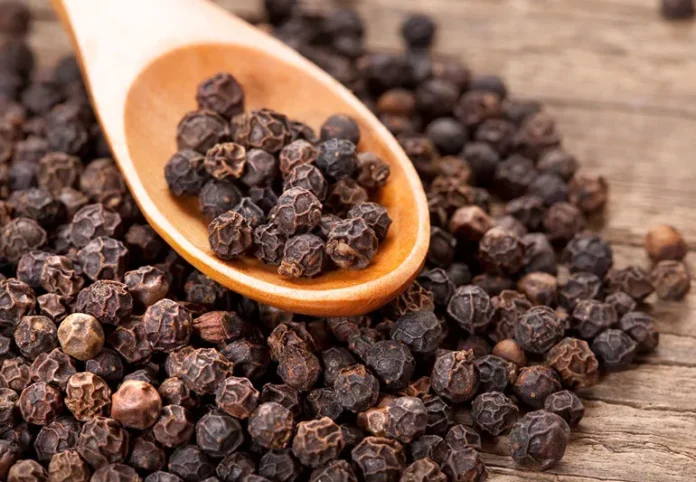What is Pepper?
Pepper is a spice derived from the dried berries of the Piper nigrum plant, commonly known as black peppercorns. It is widely used in cooking for its sharp, spicy flavor and aroma. Pepper comes in different varieties, such as black, white, and green, depending on the processing method. Rich in antioxidants and offering potential anti-inflammatory properties, it is a staple in both culinary and medicinal practices worldwide.
Types
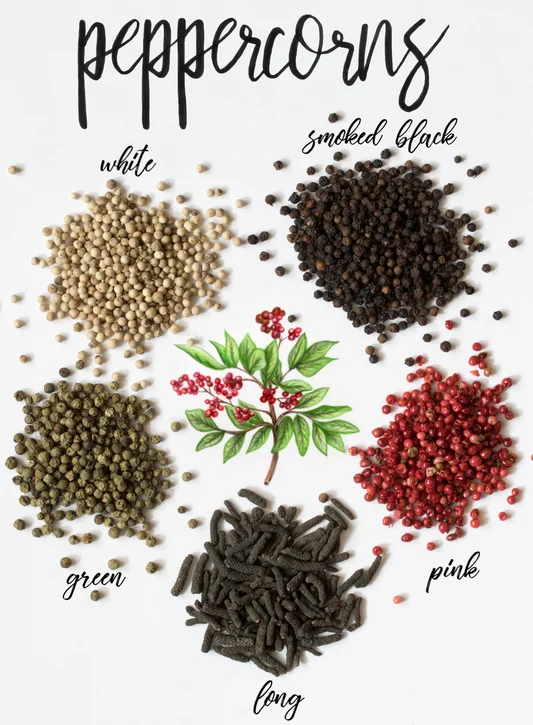
There are several types of pepper, primarily based on how the peppercorns are processed:
- Black pepper: Made from unripe, sun-dried berries. It has a strong, pungent flavor.
- White pepper: The ripe berries with the outer skin removed, offering a milder taste.
- Green pepper: Made from unripe berries, either preserved or dried, with a fresh, tangy flavor.
- Pink pepper: Not true pepper, but berries from the Peruvian or Brazilian pepper tree, with a sweet, fruity flavor.
- Long pepper: An elongated pepper with a more intense, slightly sweet spiciness.
What is Black Pepper?
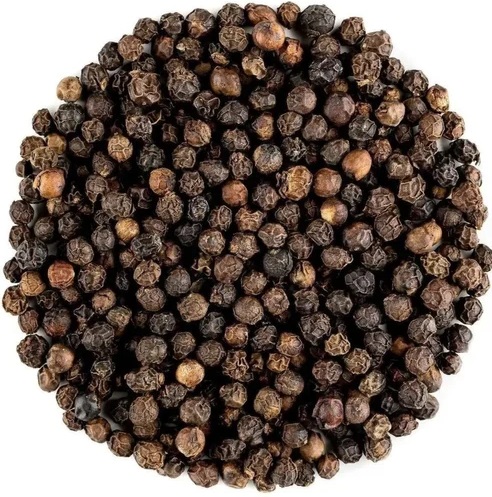
Black pepper is a spice made from small, unripe berries of the Piper nigrum plant. These berries are picked when they are green and dried until they turn black. It has a strong, spicy taste and is commonly used to flavor food. Black pepper is one of the most popular spices in the world, and it may also have some health benefits, like helping with digestion and reducing inflammation.
Forms
Black pepper comes in several forms, depending on how it’s processed:
- Whole peppercorns: The dried, black berries used in grinders for fresh flavor.
- Ground black pepper: Finely crushed peppercorns, ready for direct use.
- Cracked pepper: Coarsely broken peppercorns, offering a stronger, textured flavor.
- Pepper oil: Extracted from peppercorns, used in cooking or as an essential oil.
- Pepper extract: A concentrated form, often used in supplements for its health benefits.
Health Benefits
Black pepper is more than just a spice—it offers several health benefits, largely thanks to its active compound, piperine:
Digestion and Intestinal Health
Black pepper helps to stimulate hydrochloric acid in your stomach so you can better digest and absorb the foods you eat. It has carminative properties too, which help to reduce discomfort and gas buildup in your intestines.
Immune Support
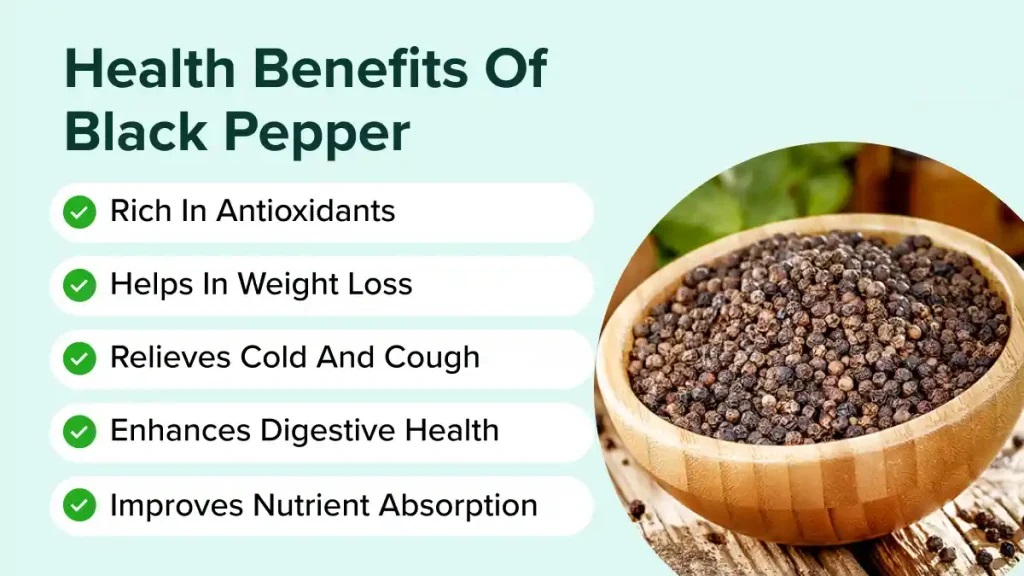
A strong immune system is important for helping you avoid illness, and black pepper can help here as well. Its active compounds have a role in boosting white blood cells, which your body uses to fight off invading bacteria and viruses.
Potential Brain Benefits
Some studies suggest that piperine may improve cognitive function and protect against neurodegenerative diseases by inhibiting enzymes that degrade neurotransmitters like serotonin and dopamine.
Lower Cholesterol Levels
Black pepper has demonstrated cholesterol-lowering effects in rodent studies and is believed to boost the absorption of potential cholesterol-lowering supplements.
Rich in Antioxidants
Black pepper is packed with antioxidants, which help neutralize free radicals in the body. Reducing oxidative stress may lower the risk of chronic diseases like heart disease and cancer.
Anti-Inflammatory Properties
Piperine has been shown to reduce inflammation, which can be beneficial for conditions like arthritis, where inflammation causes pain and stiffness.
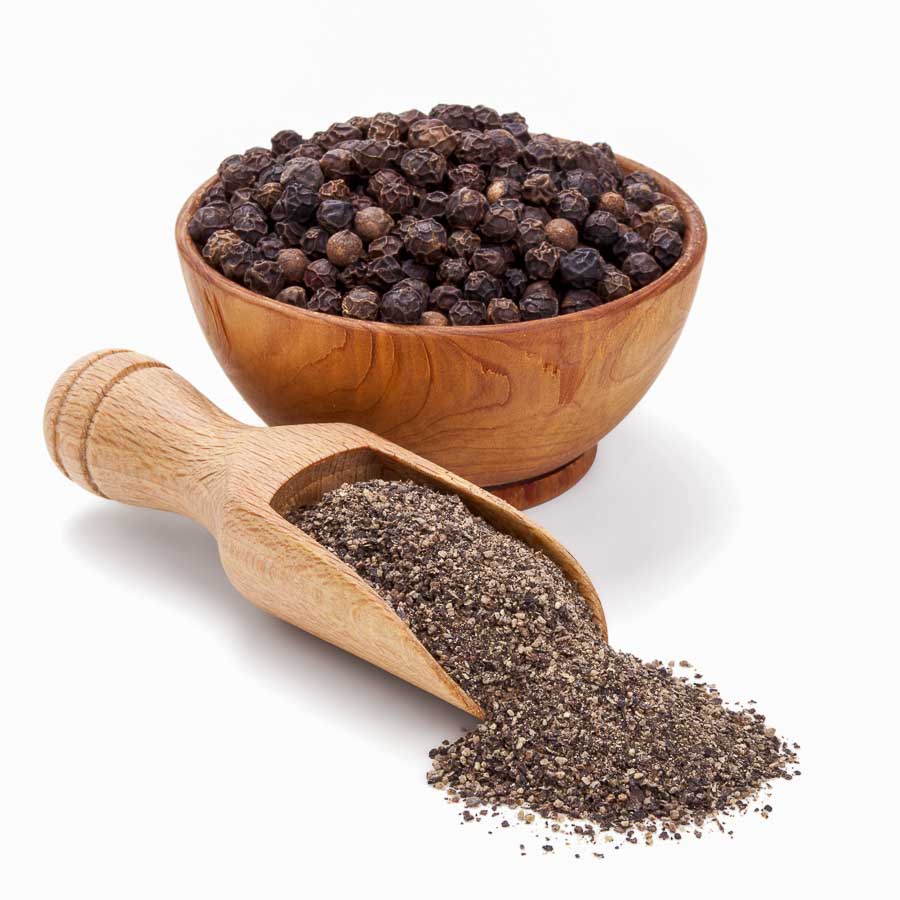
Boosts metabolism
By increasing the metabolism of fat, black pepper may assist with weight management. It also enhances the body’s thermogenic activity, which burns calories.
Enhances Nutrient Absorption
Piperine is known to improve the bioavailability of several nutrients, including curcumin (from turmeric), selenium, and vitamins like B12. This means it helps the body absorb these nutrients more effectively
Side Effects
While black pepper has many health benefits, excessive consumption can lead to some side effects:
- Gastrointestinal irritation
- Respiratory issues
- Skin irritation
- Interactions with medications
- Allergic reactions



